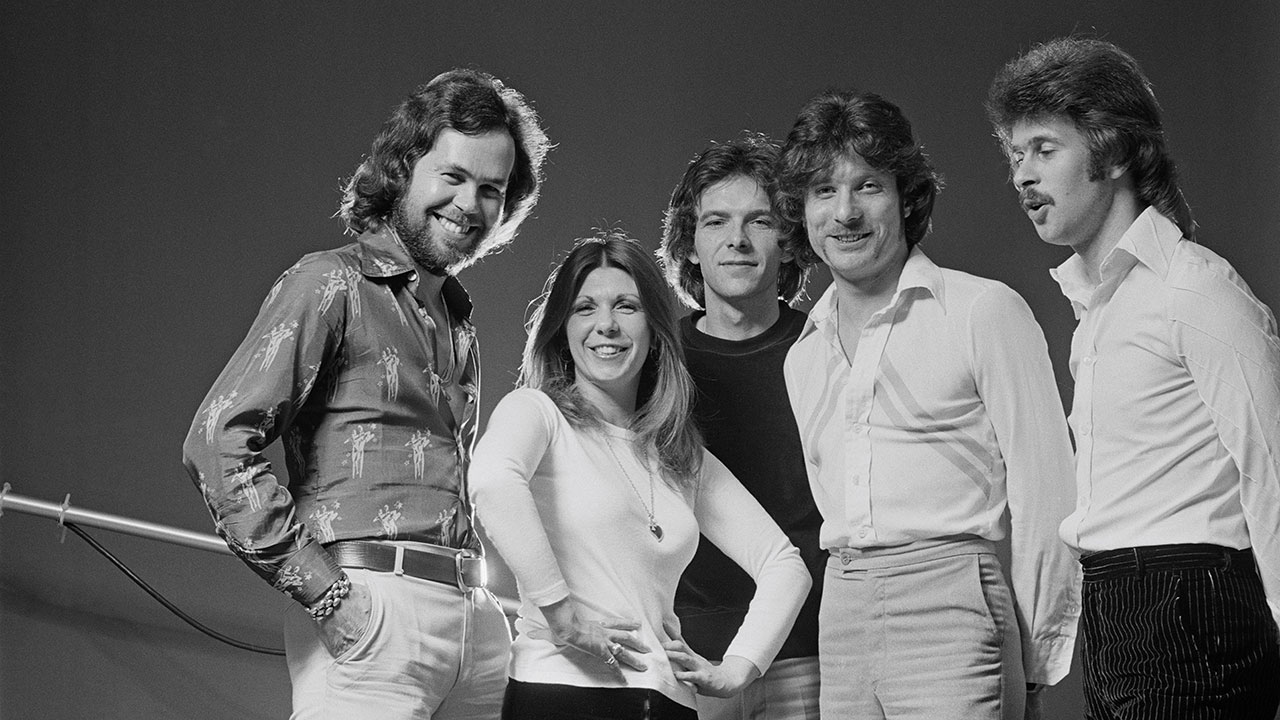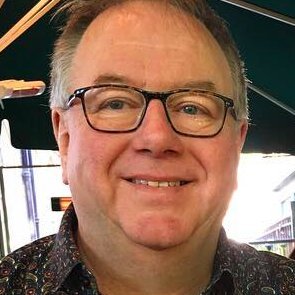In 1974, Alan ‘Fluff’ Freeman, the DJ who had been more readily associated with the Sunday tea-time chart rundown on Radio 1, showed his true prog colours on his Saturday afternoon show. He played blasts of Handel’s Hallelujah Chorus to herald a track by “the very royal ELP”, and then championed Camel’s The Snow Goose, Manfred Mann’s Earth Band’s 10-minute version of Bob Dylan’s Father Of Night, Father Of Day from Solar Fire, and another mini-epic: Mother Russia by Renaissance, from their album A Turn Of The Cards that had been released that May.
The song, written by guitarist Michael Dunford and lyricist Betty Thatcher, was based on Alexander Solzhenitsyn’s novel One Day In The Life Of Ivan Denisovich. As the group’s singer Annie Haslam says, with that sort of subject matter “it’s going to be a big song”, and the drama was accentuated by Jimmy Horowitz's orhcestral arrangement quoting The Bells Of Moscow by Sergei Rachmaninoff.
Such was the ambitious mood of the time that Dunford then began working on a stage musical based on the story of Scheherazade collated in One Thousand And One Nights. In it, a cuckolded sultan is so convinced of the infidelity of women that he weds a new virgin every day and, to ensure they never betray him, has them executed the following morning. When it’s Scheherazade’s turn, she tells him a story every night but leaves it unfinished, which so intrigues and beguiles the sultan that ultimately he spares her. On the 1,001st night, when she tells him she has no more stories, he marries her.
This series of folk tales, which includes The Seven Voyages Of Sinbad The Sailor and Ali Baba And The 40 Thieves, is thought to date back to eighth-century Persia. The work was first published in English in the early 18th century as Arabian Nights and was widely translated, inspiring a symphonic suite by Rimsky-Korsakov, and an overture and song cycle by Ravel. And of course, the 1975 album by Renaissance, titled Scheherazade And Other Stories. “It’s the three Rs,” quips Haslam, “Rimsky-Korsakov, Ravel and Renaissance.”
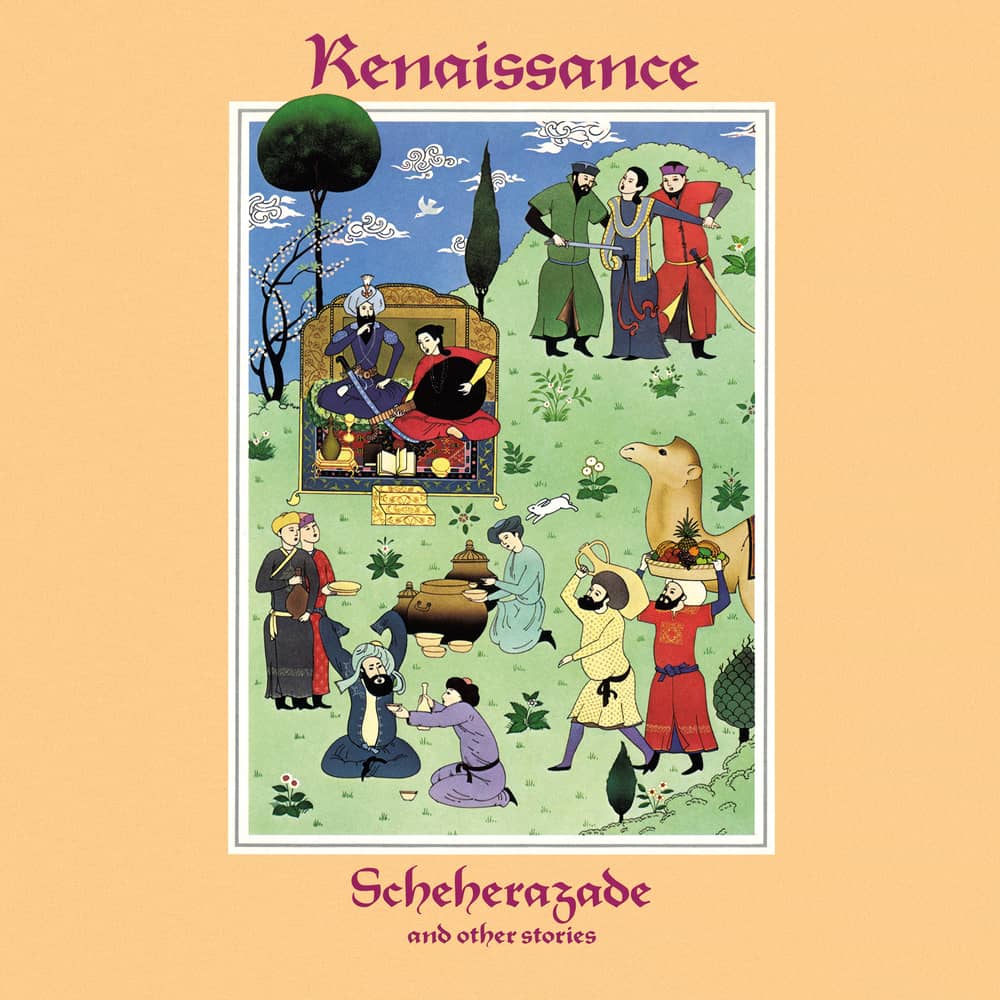
But was it a conscious move by the band to try to trump A Turn Of The Cards?
“It wasn’t planned,” she replies. “Mickey [Dunford] had come up with this idea for
a musical and he had only got so far, but the music was phenomenal. Then Betty wrote the words and it went through quite a few stages of rewriting. I wasn’t a writer of music but I gave vocal ideas and ideas for arrangements. Mickey particularly, and Betty, wrote for my voice; it was all tailor-made for me.”
But Haslam recalls that, although she was classically trained, she needed cajoling to tackle parts of what turned out to be a 24-minute composition.
“I was living in St John’s Wood and Mickey came round with a little cassette player and played his guitar,” she recalls. “He would say, ‘This is where you are going to sing’ and would give me Betty’s words. It eventually became easy, but there were parts when I said, [whining] ‘I can’t do that!’ But he was like, ‘Pull yourself together, you’ll get used to it.’ And I did. I’ve got five octaves, but I didn’t look at myself in that way, because it was so different from what anyone else was doing. There’s nothing like it now, really.”
Renaissance rehearsed the album in one of two converted barns in the grounds of Beel House in Little Chalfont, Buckinghamshire, that had once been the home of Dirk Bogarde; Jethro Tull were in the other. Haslam was completely taken by the composition.
“It sounds weird, but when I sang it I felt like I was going somewhere else,” she says. Haslam, who’s also a visual artist, explains that before she starts painting she feels a sense of connectedness with the work, and that she had the same feeling with Scheherazade. “I said to Mickey: ‘I don’t think you quite realise how much you touch people with this music, but it goes deep. It fills you up completely.’”
Renaissance’s Scheherazade And Other Stories was released in July 1975. It was recorded at Abbey Road and orchestrated by Tony Cox, who had worked with Spirogyra, Trees and Mike Heron, and on the recording he conducts the London Symphony Orchestra and a choir. The results are more fluid and nimble than many examples of orchestrated rock. Drummer Terry Sullivan plays in a subtle style, Dunford plays acoustic guitar and Tout generally plays piano. There’s more brio than bombast, and they avoid the potential problems of the mid-range frequencies of electric guitars and keyboards muddying up the sound of the orchestra, particularly strings.
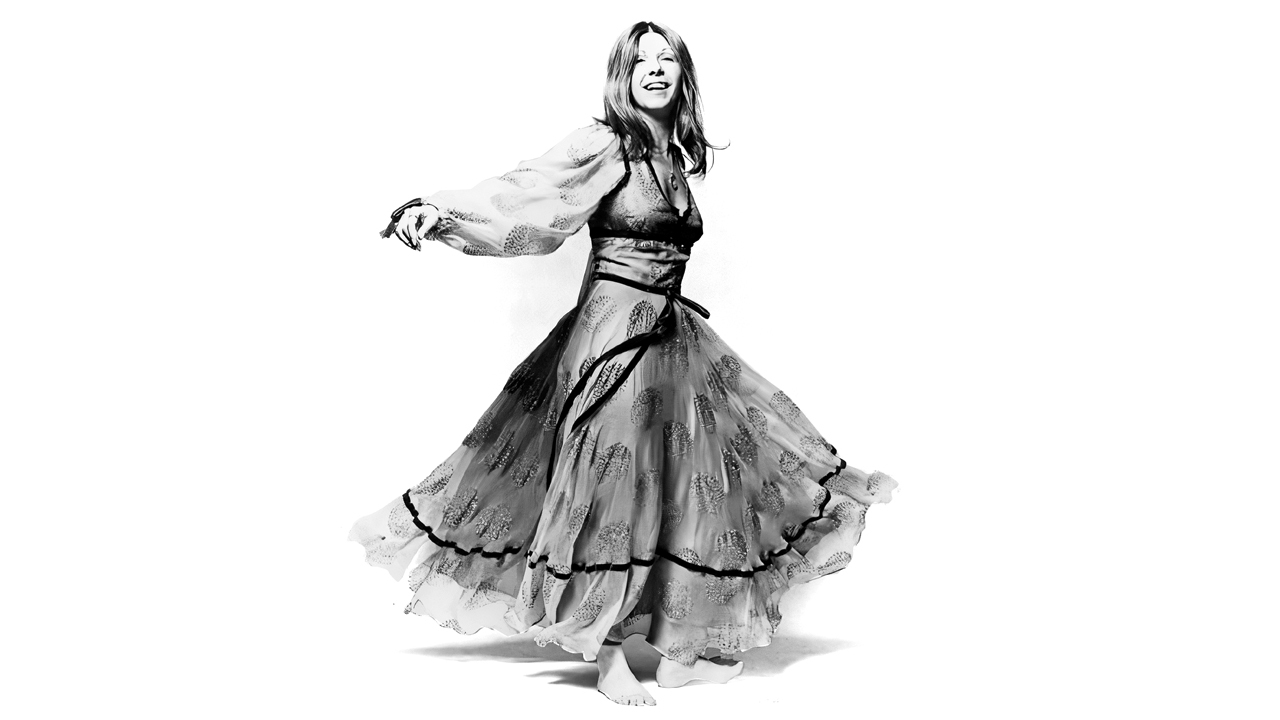
Tout had enjoyed including classical quotations in Renaissance material, and on Scheherazade he slips in a few bars of The Sea And Sinbad’s Ship from Rimsky-Korsakov’s symphonic suite. But although it might have been a general inspiration, it’s the only appearance of material from that composition.
Another quote on the album is Dmitri Shostakovich’s four-note musical signature, DSCH (in German, Es translates to E-flat and H to B), which crops up on the 11-minute Trip To The Fair. It sets the tone for an uncanny evocation of a deserted fairground. Tout’s twinkling keyboards play circular passages that sound like creepy calliopes and there is a disquieting echoed laugh. “When we were recording the song, I got to certain parts and started laughing because I got it wrong,” Haslam explains. “I did it three times but the laugh was in a different place. So when we played it back we decided to keep them.”
In fact, Betty Thatcher’s lyrics were based on a specific romantic episode that took place in Easter 1975. When Renaissance had a few days off, Dick Plant, the engineer at De Lane Lea studios where they had recorded Turn Of The Cards, called Annie Haslam.
“He said: ‘Why don’t you come down to the studio? Roy Wood is going to be here and I think you two are going to hit it off.’ I thought, ‘Hmmm... green hair’. So I went down and it was love at first sight. His sense of humour was the first thing, but he was a handsome man underneath all that hair.”
Wood asked her to dinner at Trader Vic’s in the Hilton on Park Lane, and they went there with Plant and his wife. “I lived in Hampstead at the time and I said: ‘There is a fair at Hampstead Heath, let’s go up there.’ We drove up and when we got there it was as dead as a doornail. It was dark – spooky, actually.
“Betty had said, ‘Call me up after your date, I want to know what happened’. So I did and she came up with Trip To The Fair. She did that with a few songs. Ocean Gypsy, also on the album, was about me and [the band’s manager] Miles Copeland. He was my boyfriend for two years from 1972.”
Another strong melodic song, with a haunting instrumental section featuring piano, orchestra and choir, Ocean Gypsy became a live favourite, but without Haslam realising that she was singing about herself. “I never thought about it and she didn’t tell me about it until years later,” she says. The only song on the album that she’s not so keen on is the brief The Vultures Fly High. “Maybe because of what it’s about,” she says. “We got some terrible press in England. At one point they said we were pompous and blah, blah, just because we were different. Betty wrote that about the press – they circle over us all.”
This attitude of the UK music press partly explains why Renaissance concentrated their activities in the US and mainland Europe. Just before Scheherazade And Other Stories was released in the US, the band played three sold-out shows at Carnegie Hall in New York City in June 1975, with Cox conducting the New York Philharmonic and a choir. Haslam explains that their popularity over there was due in part to radio exposure.
“Two DJs really helped the band, and they were the same with Yes and Genesis: Ed Sciaky who was on WMMR in Philadelphia, and Alison Steele who was on WNEW in New York,” she says. “They played us all the time and there was an amazing demand from promoters, so that’s why we concentrated our time in [North] America rather than England.”
Recordings were made of the shows with The Rolling Stones’ mobile studio, which were released as the double album Live At Carnegie Hall in 1976. How did Song Of Scheherazade go down in concert? The live version was a full 28 minutes long and no one would have heard it before.
“I think people were floored by it, and the version of Ashes Are Burning, from the same show, was one of the best that we ever did,” says Haslam. “It was brilliant and you’ve got all the energy of the audience. It was amazing to have a choir as well.”
Song Of Scheherazade climaxes with some spectacular singing from Haslam.
“When I sang …Scheherazade onstage it was so emotional,” she recalls. “I love the piece so much – we all did, you could feel we were all gelling onstage. My voice just soars and when that high note at the end came you could feel everyone in the audience go, ‘ahhhh!’”
It must have been a costly venture playing live with a world-class orchestra. Is it true that there was much more money in the music business back then?
“Yes, but you’ve still got to pay it back,” she replies. “You don’t get a royalty cheque for God knows how long afterwards.”
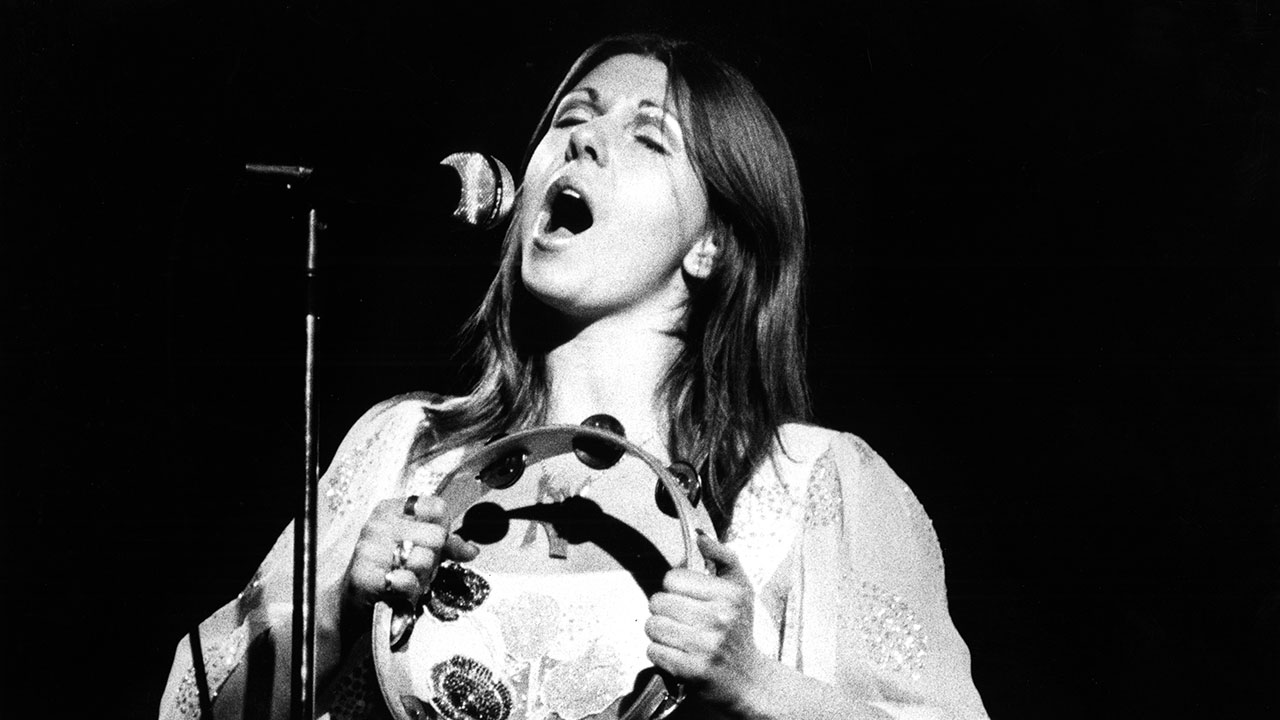
Back in the land of vultures, Renaissance were playing smaller venues. The recent reissue of Scheherazade And Other Stories includes a live recording from January 1976 at Nottingham University. Did this feel like a come down after playing at Carnegie Hall with the orchestra?
“I don’t think it really bothered us because when you’re a musician you just want to play,” Haslam replies. “I understand what you’re saying but we would just go on with it and it sounded great. I am amazed that we could ever do …Scheherazade live with only four musicians. But Jon Camp was a brilliant bass player and he did a lot with his foot pedals. John Tout had three keyboards and I sang some of the flute parts.”
Scheherazade And Other Stories remains very highly regarded and some reckon it’s one of the most important progressive rock albums of the 1970s. How highly does Haslam rate it?
“It’s difficult to say, because the albums are all so different,” she says after a thoughtful pause. “I think A Song For All Seasons is a masterpiece as well. Mikael Åkerfeldt, the singer with Opeth, is one of our biggest fans and particularly likes that album. Turn Of The Cards is also way up there. But I think that musically Scheherazade… is the one.”
This article originally appeared in issue 129 of Prog Magazine.
